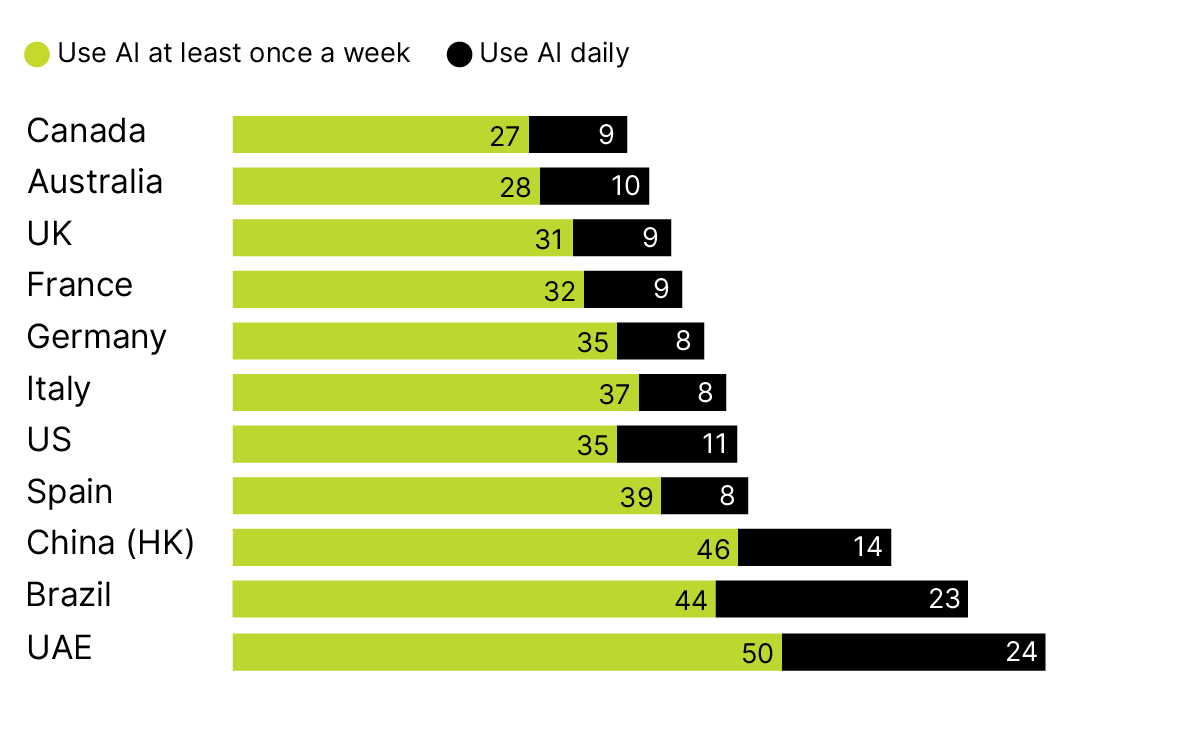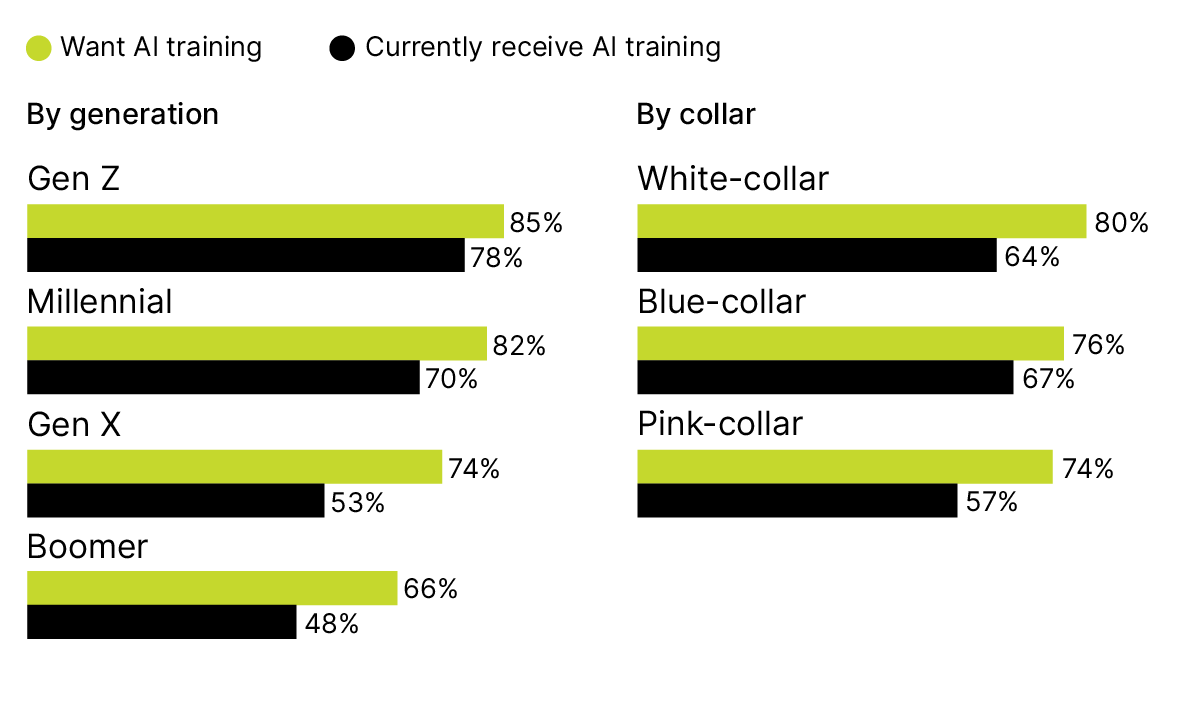Generative artificial intelligence is transforming the world and the workplace, but there is a big disconnect between employers and employees. While CEOs recognize its potential and many already are redesigning work to streamline operations or gain a competitive advantage, they underestimate what’s required to achieve the productivity improvements. The swift adoption has left many employees with inadequate skills and worsening morale.
Leaders eager to limit risk, retain talent, and increase productivity should provide the training, transparency, and compassion workers want and need. Here’s how:
Provide training
Generative AI has existed for decades, but the introduction in late 2022 of ChatGPT dramatically accelerated its adoption. More than 50% of workers now use it at least weekly, and 15% use it daily, according to a new report on generative AI by the Oliver Wyman Forum. Uptake was especially strong in the second half of 2023. Depending on the industry, employee use jumped to a range of approximately 35% to 75% in November from 10% to 60% in June.
Generative AI use skyrockets across the world

How often are you using generative AI in your current job? % all employees, by country. Source: Oliver Wyman Forum Generative AI Survey, October–November 2023, 16 countries, N=16,033.
The growth occurred so quickly that many companies haven’t yet provided much-needed guardrails, and many employees don’t know how to optimize queries, identify bias, or check for plagiarism. The result: increased risk, misuse, and growing anxiety. Some 84% of workers who use generative AI said they have exposed their company’s data via public generative AI tools in the last three months, according to the report. Over 40% said they have seen incorrect generative AI outputs, and almost 10% have used the technology behind their employer’s back.
One reason for the frequent misuse is that many companies expected their employees to teach themselves. There’s also a disconnect between worker expectations and what leaders think. Almost all the employees we surveyed – 98% of them – said they would need additional training within the next five years due to generative AI, a view shared by only 40% of CEOs, according to IBM.
Almost a third of workers already are pursing learning opportunities in response to AI disruption, but more than half said the company training was inadequate. Most want more upskilling directly from employers, including 80% of white-collar workers, 76% of blue collars, and 74% of pink collars.
Employees of all ages and job types demand more generative AI learning opportunities

% employees who want AI training versus currently receiving AI training. Question: “What types of AI training does your employer currently provide, and what types of training do you want your employer to provide?”
Source: Oliver Wyman Forum Generative AI Survey, October–November 2023, 16 countries, N=15,277 (by collar), N=16,033 (by generation).
Address anxiety
Leaders need to acknowledge and address employee anxiety about job security or risk discord and talent loss. The World Economic Forum estimates the technology will impact almost a quarter of global jobs in the next five years, adding 69 million while eliminating 83 million. Already, 60% of employees fear that generative AI could make their jobs obsolete. That concern is much greater among those who report that their employers provided guidelines on the technology.
These fears already are negatively impacting morale and productivity. Almost a third of job seekers said they are looking for new positions because of generative AI disruption. Those worried about AI are 57% more likely to feel that their productivity is declining, and 40% more likely to feel ineffective at work, according to the American Psychological Association.
Focus on quick wins with compassion
Companies are more likely to retain talent if they communicate clearly and regularly about how generative AI can benefit both the individual worker and the organization. Leaders also should prioritize the work and not the technology by identifying specific tasks where generative AI can create improvements. When looking for efficiency, a good place to start is with highly repetitive, rules-based tasks. Getting generative AI to do that work could free up employee time for more creative and thoughtful work.
Finding quick wins for the employee and organization is critical as some of the longer-term productivity and other benefits will not be seen for years – and employees will still have to test, learn, and stay engaged during this period. Getting their feedback and leading with empathy can enable everyone to understand how generative AI can help individuals and the company be more successful.
By Ana Kreacic and John Romeo
What happens when economic optimism confronts rising geopolitical tensions and uncertainty? That tug of war was the unofficial theme that permeated the annual gathering of the global business and political elite at the 2024 World Economic Forum (WEF).
On purely business grounds, the mood was relatively buoyant among chief executives, entrepreneurs, and financiers who attended the meeting from January 15 to 19. That reflected the continued strength of the U.S. economy, which ended 2023 on a high note and stands to benefit if expectations for further disinflation and rate cuts pan out in 2024, as well as robust growth across much of Asia, led by India. Also, CEOs have become more comfortable with uncertainty after dealing with it for so many years.
Yet more clouds are gathering on the horizon: Ever-growing geopolitical risks from wars in Ukraine and Gaza and escalating attacks involving Yemen’s Houthi militia, U.S. military forces, and Iran; potential political turmoil as major countries led by the United States hold elections amid worsening misinformation and polarization; the mounting costs of a warming planet, and the looming disruption of generative artificial intelligence (AI). And these risks are closely interrelated.
Misinformation/disinformation and societal polarization ranked as two of the top three risks in the WEF’s latest Global Risks Report, published in collaboration with Oliver Wyman parent Marsh McLennan and Zurich Insurance. For most Davos attendees, those risks loom large in the United States, where Donald Trump is the overwhelming favorite to win the Republican nomination for November’s presidential election. Trump allies in Congress, meanwhile, have been blocking fresh military aid to Ukraine, whose president, Volodymyr Zelenskyy, appealed for support in a speech to Davos participants.
Premier Li Qiang led a large Chinese delegation at Davos and said China’s economy was back as a global motor after the COVID-induced slump of 2022. But China wasn’t front and center the way it had been in previous years’ meetings. That reflected reduced interest from global investors and a growing challenge for regional leadership from India, which has grown faster than China for the last three years. A big Saudi presence, meanwhile, underscored the growing economic and political clout of the country and its Gulf neighbors, a tangible sign of the world’s increasing multipolarity.
Climate and sustainability wasn’t as prominent an issue as in recent years, and that’s not necessarily a bad thing. It’s now a working topic on the agenda of every business, and there was a sense of optimism in private roundtables, where conversations focused on the nuts and bolts of sustainability, that we have the technology and the capital to make real progress.
Generative AI arguably upstaged the global leaders at Davos, and that was no deepfake (but did feel very frothy, especially on consumer AI). Loud signs proclaiming the age of AI lined the Promenade, the resort’s main drag, where big tech companies including Google, Microsoft, and Salesforce took over local storefronts. The technology was the focus of conversations private and public, including a breakfast panel discussion on Tapping AI’s Power To Optimize Our Working World, hosted by the Oliver Wyman Forum and Mercer. The consensus view was that user adoption has exploded and business should move quickly to adopt generative AI and identify promising use cases while closely managing risks.
Moving fast into an uncertain future may be the defining risk of our age. OpenAI CEO Sam Altman, who attracted as much attention as any global leader, predicted technologists would achieve artificial general intelligence, an AI with intellectual capability equal to humans, in the “reasonably close-ish future.” He played down its likely impact, though, saying it would “change jobs much less than we all think.”
We look forward to assessing that prediction in the coming year.
Ana Kreacic is COO and John Romeo is CEO of the Oliver Wyman Forum

